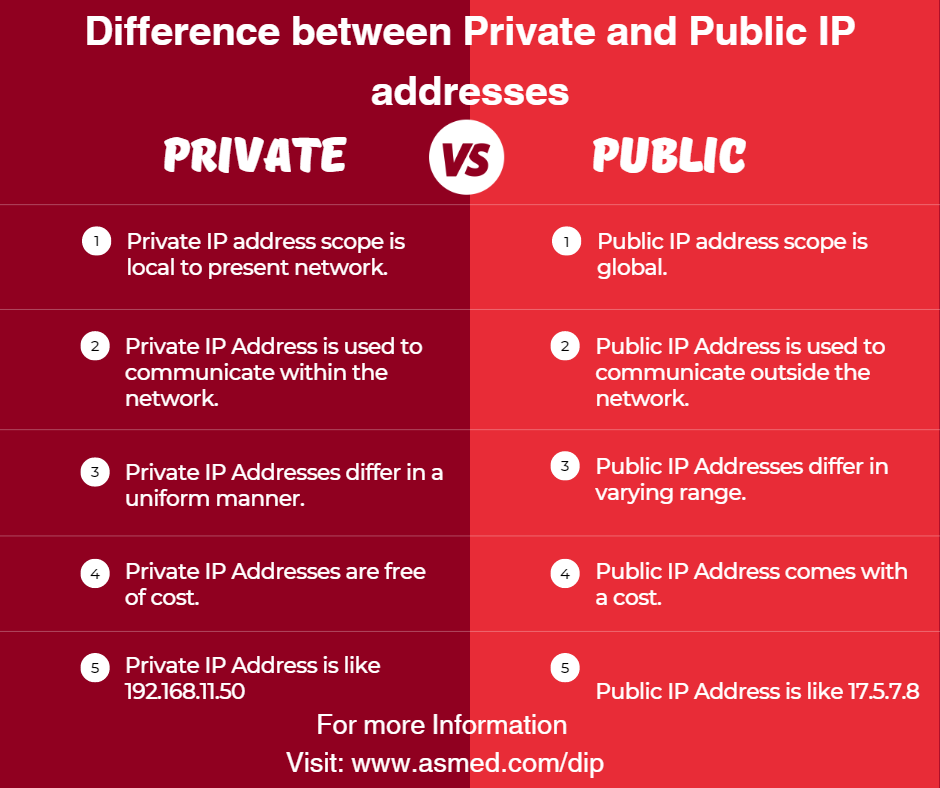Difference between Private and Public IP addresses

What is an IP Address?
An IP address (Internet Protocol address) is a numerical identifier, such as 192.0.2.1, that is associated with a computer network that communicates using the Internet Protocol. An IP address is used for two purposes: identifying a host or network interface, and addressing a specific location.
An IP address has two primary functions: it identifies the host, or more particularly its network interface; and it indicates the host’s position in the network, allowing a path to be established to that host.
IP addresses can be either Public or Private. Read through this article to find out how a Public IP address is different from a Private IP address.
What is a Public IP Address?
Your internet service provider assigns a public IP address to your network router so that it may be accessed directly over the internet (ISP). When you connect to the internet using your router’s public IP, your personal device has a private IP address that is concealed.
Connecting to the internet using a public IP address is similar to sending mail to a P.O. box rather than giving out your home address. It’s a little safer, but it’s a lot more noticeable.
What is a Private IP Address?
The address that your network router provides to your device is known as a private IP address. Each device on the same internal network is given a unique private IP address (also known as a private network address) that allows them to communicate with one another.
Private IP addresses enable devices on the same network to interact without needing to connect to the internet. Private IPs assist to strengthen security within a specified network, such as your home or workplace, by making it more difficult for an external host or user to establish a connection. This is why you can print papers from your home printer using a wireless connection, but your neighbor can’t send their files to your printer accidentally.

Difference between Private and Public IP Addresses
The following table highlights the major differences between Private and Public IP addresses −
Key | Private IP Address | Public IP Address |
Scope | Private IP address scope is local to present network. | Public IP address scope is global. |
Communication | Private IP Address is used to communicate within the network. | Public IP Address is used to communicate outside the network. |
Format | Private IP Addresses differ in a uniform manner. | Public IP Addresses differ in varying range. |
Provider | Local Network Operator creates private IP addresses using network operating system. | Internet Service Provider (ISP) controls the public IP address. |
Cost | Private IP Addresses are free of cost. | Public IP Address comes with a cost. |
Locate | Private IP Address can be located using ipconfig command. | Public IP Address needs to be searched on search engine like google. |
Range | Private IP Address range: 10.0.0.0 – 10.255.255.255, 172.16.0.0 – 172.31.255.255, 192.168.0.0 – 192.168.255.255 | Except private IP Addresses, rest IP addresses are public. |
Example | Private IP Address is like 192.168.11.50. | Public IP Address is like 17.5.7.8. |
Conclusion
Private IP Address and Public IP Address are used to uniquely identify a machine on the Internet. Private IP address is used with a local network and public IP address is used outside the network. Public IP address is provided by the Internet Service Provider (ISP).
A public IP address is a one-of-a-kind numeric code that is never repeated by other devices, whereas a private IP address is a non-unique numeric code that can be reused by other private network devices.







